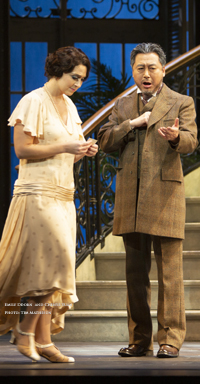
 |
 |
|
Dates and Venue October 17, 19 and 24 at 7:30pm; October 27 at 2:00pm | The Queen Elizabeth Theatre, Vancouver Conductor Yves Abel Director Alain Gauthier Set and Costume Designer Christina Poddubiuk Choreography Tracey Power Lighting Designer Kevin Lamotte Chorus Director Leslie Dala Stage Manager Marijka Asbeek Brusse Violetta Valery
Emily Dorn Alfredo Germont Andrew Haji Giorgio Germont
Chenye Yuan Flora Gena van Oosten Baron Douphol
Nicholas Borg Dr. Grenvil Angus Bell Annina Irina Medvedeva Sung in Italian with English surtitles Reviewer Elizabeth Paterson |
|||||||||||||||||||||||||||||||||
|
Vancouver Opera opened its 60th season in sumptuous style with Verdi’s perennially popular masterpiece La Traviata. The 19th century fantasies of the fallen woman, hearts of gold and death from disease so painful and common as to be almost fashionable are still tropes in our own day. The production draws attention too to the hedonism, frivolity and conspicuous consumption of the idle rich of times past and, by implication, of the present day, with gorgeous costumes and lush sets, both by Christina Poddubiuk. Even the retreat in the country where the lovers go to be alone is bedecked with balcony and sweeping staircase and awash with sunlight. Indeed, the vigorous lighting is almost a character in itself, deeply embedded in the action. While the lighting is almost garish in the party scenes, lighting designer Kevin Lamotte’s depiction of the dawn slipping through louvred windows in the last act adds yet another layer of sadness to an already poignant scene. Emily Dorn’s Violetta is a thoroughly modern party girl, in charge of her own life, despite its being financed by Count Douphol, a convincingly unpleasant Nicholas Berg. Besides having the chops to make Violetta’s challenging music seem as easy as breathing and light as air, her acting skills are finely tuned. Her enjoyment of the opening party, full of charm and gaiety, and her developing consideration of the possibility of true love with Alfredo in Act I are the foundation of the Act II confrontation with Alfredo’s austere father, Giorgio Germont (Chenye Yuan). In their conversation, Violetta reverses Germont’s opinion of her as a mercenary tart and Germont unbends from authoritarian to affectionate father. Both singers did full justice to Verdi’s astonishing writing, which moves from a fast and almost strident sound through a gentler, slower section to end in harmony. Chenye Yuan became considerably more sympathetic, his voice warming and growing richer, so that a little later, as Germont tries to persuade his son to come home, his showpiece aria, Di Provence il mar was full of the warm south, generous and beautiful. By contrast, Alfredo’s journey is the reverse. Andrew Haji has a voice to die for and knows just what to do with it. The brindisi, "Libiamo", was full of joie de vivre, "Un dì felice" full of love, "Invitato a qui seguirme" full of rage. The final act takes place in Violetta’s bedroom as she lies dying. Alfredo has written that he will come; Violetta is afraid she will die before he arrives. She remembers her old dreams in the melancholic, "Addio del passato", Farewell to the dreams of the past). But then he arrives at last, and joyously they plan for the future "Parigi, o cara i". It is too late, Violetta dies. Director Alain Gauthier never lets the audience wallow in pity but slowly tightens the screws, constantly making physical the progress of Violetta’s disease in time to Verdi’s musical picture. Three young singers from the Yulanda M. Faris Young Artists Program (Nicholas Borg is a fourth) acquitted themselves well: Irina Medvedeva (Annina, Violetta’s maid) was a constant, caring presence, Gena van Oosten (Flora) was brittley beautiful and Daevyd Pepper (Gastone) a cynical young man about town. Angus Bell stood out as firm friend and thoughtful doctor, Grenvil. Inventive choreography by Tracey Power added layers of fun and frenzy to the party scenes. Yves Abel led the excellent Opera Orchestra cleanly through Verdi's constantly shifting moods, keeping the long arcs of structure firmly in hand and building the emotive power to a satisfying conclusion. © 2019 Elizabeth Paterson |
|||||||||||||||||||||||||||||||||||